King Arthur II Review
Posted by
with_teeth26
on
While it seems Role Playing Game elements are being inserted into every genre imaginable these days, the unique blend of turn-based and real-time strategy the Total War series is known for has remained on an island of its own. King Arthur II sets out to change this, by blending the structure of strategy gameplay found in the Total War games with role playing elements in a way that has really never been seen before. Sadly, King Arthur II stumbles badly on the strategy side of the equation, and the role playing elements, while good, simply aren’t prevalent enough to work on their own.
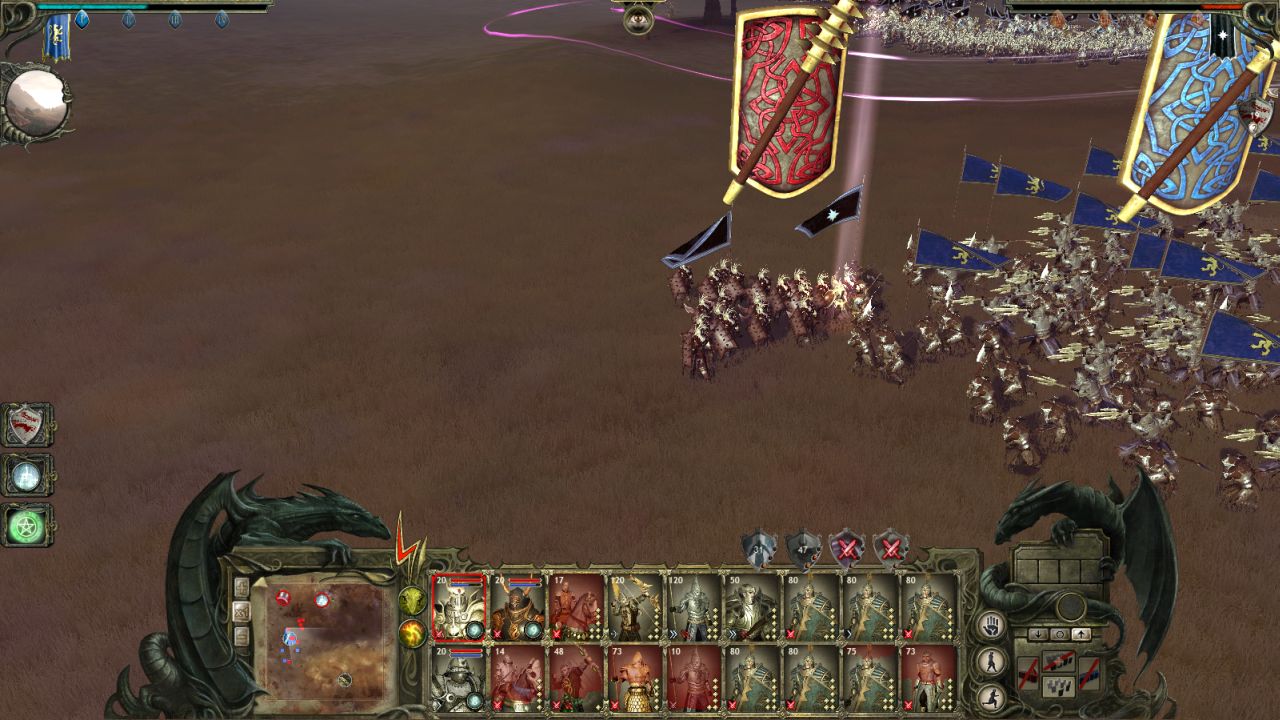
The outcome of this encounter should be easy to predict
If you are familiar with the style of strategy found in the Total War games, King Arthur II will seem immediately familiar. You march around on a ‘world map,’ in this case of the UK, expanding your empire and building your army. When you engage in conflict, you have the option to play out the battle in real time. Where King Arthur II differs from the Total War series is that initially you only have a single army (this is later expanded to 3), and your primary focus is completing quests. King Arthur II is, after all, a story driven game, and because of this it separates itself from the Total War series fairly easily despite obvious similarities in appearance and controls.
First I’ll explain how the strategic aspect of King Arthur II works. Your main focus here is to get an army that is as strong and diverse as possible. As you progress through the game and expand your empire, more and more units will become available to you. When you take the units you already own through battle, they level up, and you can choose to upgrade each units’ abilities and stats individually. If you keep a unit alive for long enough, it will obtain veteran status, and keep pace with the rest of your army as you replaced destroyed units with more powerful versions. Any towns or villages you own can be used to construct buildings which bolster the damage, health and other attributes of different units. In most cases you have to choose a single building to construct which will only bolster the stats of a single type of unit. You can also engage in diplomatic relations with other provinces to secure peace treaties or trade agreements which again bolster your armies and economy.
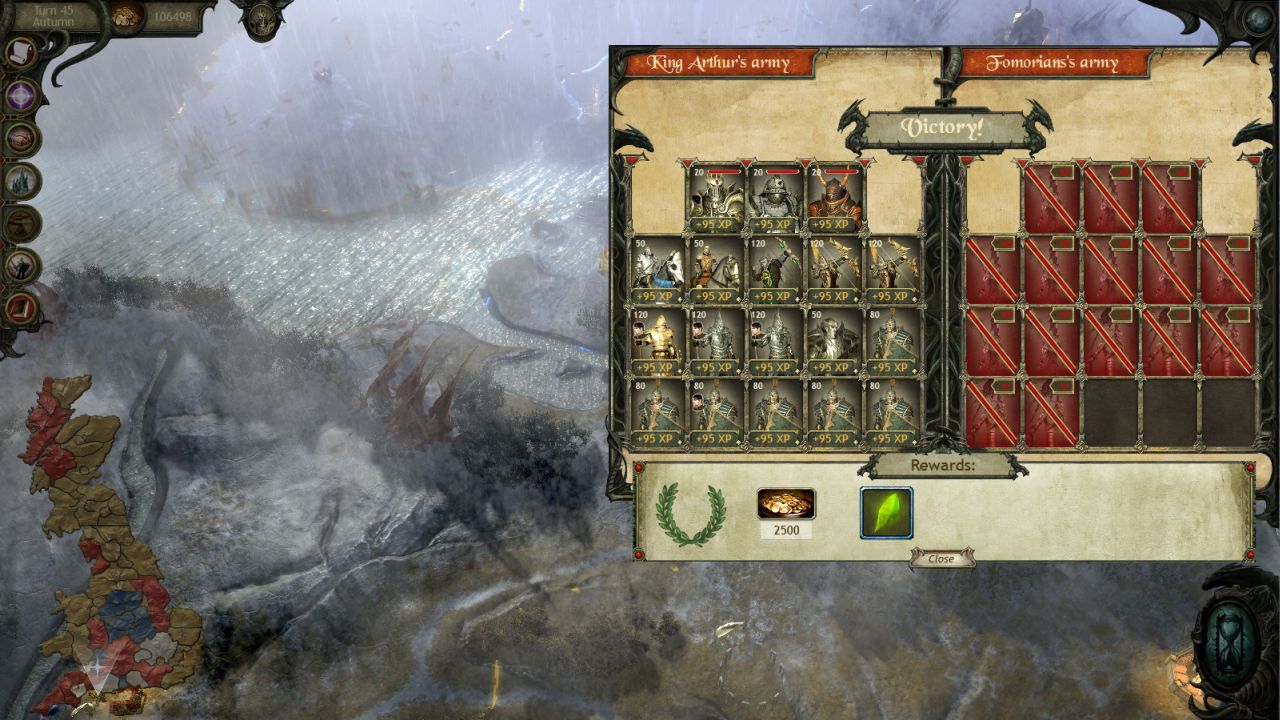
The auto-battle button may as well be called auto-win
Sadly, the strategic depth is in reality very limited. You don’t need to worry about defending your empire once you have it; enemy units simply won’t try and attack your buildings or try to retake provinces. Enemy armies might march armies around your empire, but they don’t actually do anything, save your main foes, the Femorians, who might infest a village with a disease, which can usually be cured through a quest which I will get to later. Your army does include Hero units which work similarly to Generals in the total war games. They will provide bonuses for your troops while in battle, and usually have a number of different special abilities.
While it comes to conflict, you have the choice of either fighting the enemy in a real-time battle, or using the auto-battle function to let the computer decide who wins. It is with these battles that King Arthur II’s biggest flaw is exposed. They are too easy, and the enemy AI is utterly brain dead. On the normal difficulty, in the first half of the game, you can probably get through most real time battles by selecting your entire army, right clicking on the main enemy blob of units, and watch your army move in and destroy your foes. Later on there are a few battles that are paradoxically difficult where the enemy will use flying or special units which are incredibly hard to counter, since archers get destroyed quickly and you are only given access to a couple of flying units yourself. Most of the time however, you will not be challenged in the least.
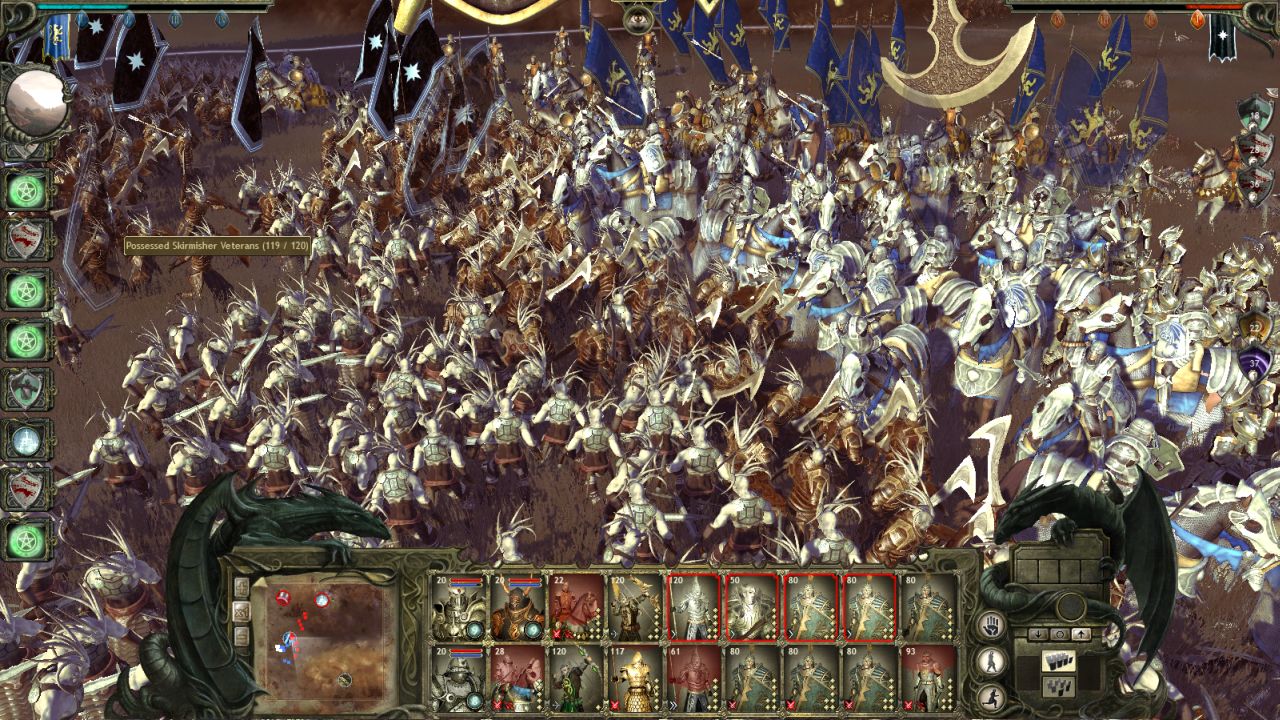
Battles have a tendency to descend into anarchic brawls
This is a huge shame, because in these battles you are provided with a good number of different magical abilities that are very fun to use. Scattered across the maps are different outposts that if captured will grant your army some kind of bonus or ability. Some are passive, giving your army health or damage bonuses, or slowly draining the enemies ‘magic shield’ which absorbs any spells you cast. Other outposts provide active abilities, such as a lightning bolt that comes from the sky and satisfyingly sends enemy units flying. However, the game tends to place most of these outposts near the enemy army, so they are usually being used against you rather than by you. Despite this advantage, the enemy units generally provide no challenge whatsoever. Your hero units also add have a few abilities that can be used in battles, some of which bolster your units, others which damage or slow enemy units, but again, they are moot when the battles are as easy as they are here. At least the battles provide an impressive spectacle as hordes of troops charge towards each other, a spectacle that can be replicated through the only non-campaign mode, scenario, where you can create custom battles.
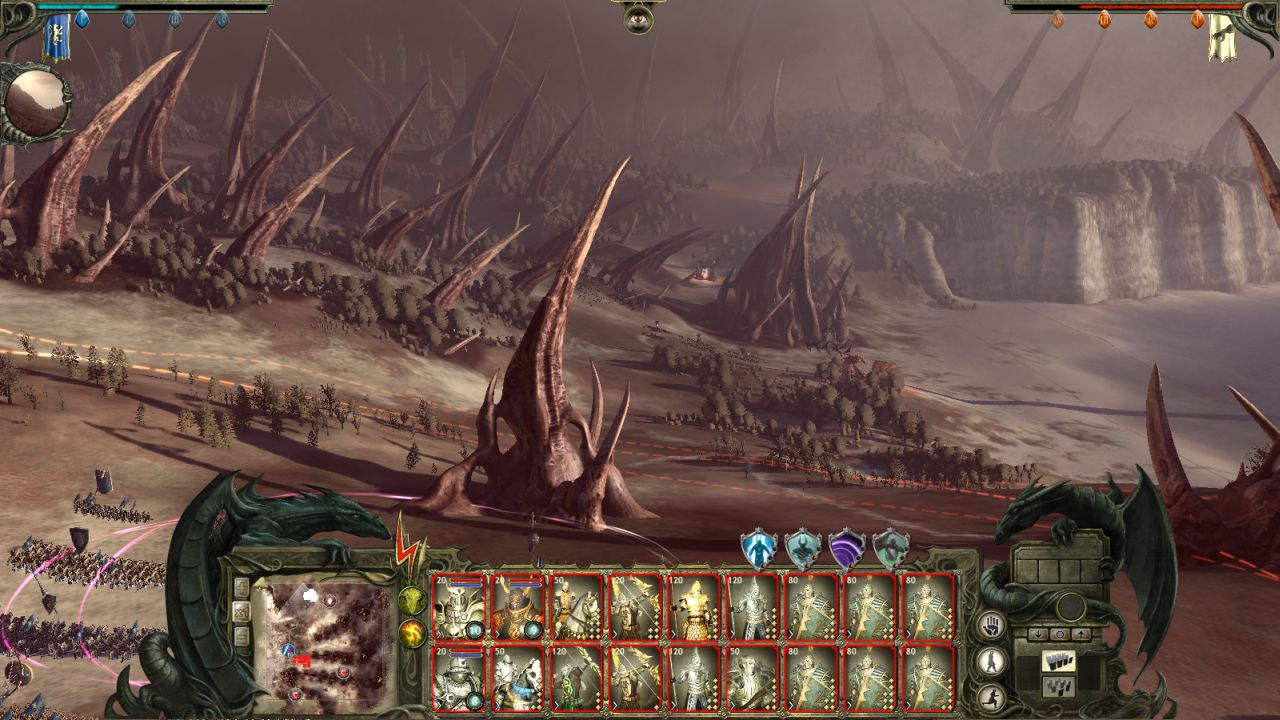
Landscapes in the game are varied and imposing
So, since the real time battles are so easy, shouldn’t the auto-battle function serve as a more balanced option? Sadly, this button might as well be called the auto-win button, as I never lost a battle whenever I used it. I never even lost a single unit. To cap it all off, you are rewarded with obscene amounts of money after most battles. By half way through the game, I had more money than I could possibly spend. Since the game’s entire strategic element is focused around your army and these battles, their uneven and usually pathetic difficulty practically breaks the game. There are other elements you can use, such as magic shards and artifacts that strengthen your army and give you interesting abilities, or individual weapons and pieces of armour that you can equip your heroes with to improve either their magical or combat abilities, but in reality, these are all superfluous since the battles are so one-sided. While the game does offer difficulty settings that slightly increase the challenge, the poor enemy AI remains unchanged, as does the outcome of most battles.
If King Arthur II was strictly a strategy game, it would be impossible to recommend in its current state. However, it is also a role playing game, and the RPG elements here are much more impressive than the strategic ones. King Arthur II’s campaign does have a story, with you playing the son of the wounded King Arthur. Your job is to find a way to cure your father, as it quickly becomes evident that the wounds he has sustained are magical in nature. You learn that the demonic Femorian forces have opened gates all over the continent and are infecting people with a strange demonic plague. Your overarching objective in King Arthur II is to stop the Femorians and find a way to cure your father.
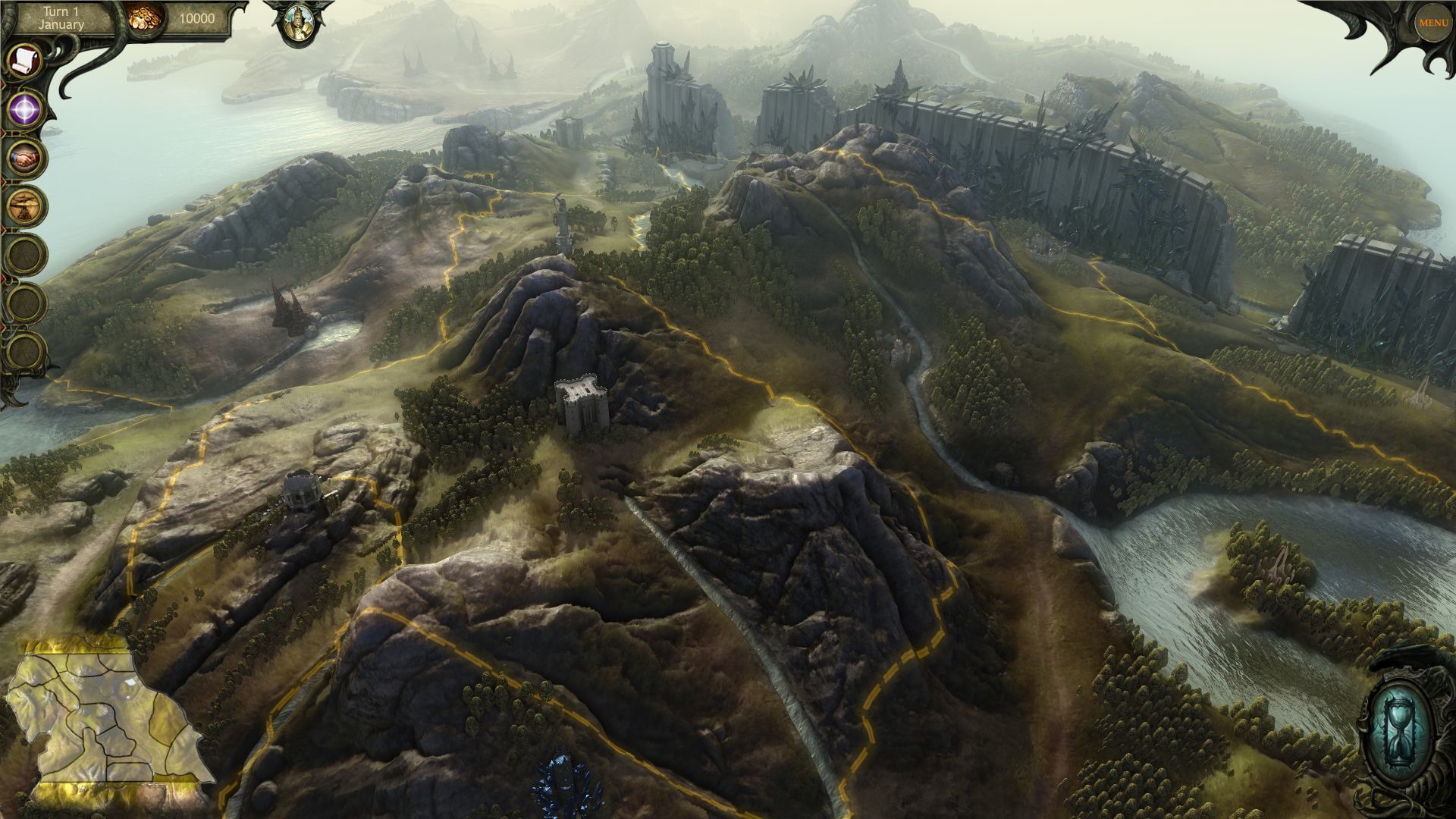
The world-map is used for quests and broader strategic decisions
To progress the story, you must complete a series of quests. These come in a number of different forms; adventure quests, diplomacy quests and battle quests. Adventure quests are probably the highlight of the game, and are essentially interactive stories where a series of occurrences are described to you and you must make decisions as to how to proceed. These segments are generally well written with a strong use of imagery that really draws you in to the scene. The decisions you make during these can dramatically alter how they play out, and can lead to different outcomes, including in some cases battles and different rewards. These adventures are generally voiced by a single voice actor, and while he makes a valiant effort, there are times when having at least one female voice actor would be a huge benefit as a man doing the voice of a young maiden simply sounds silly. During these segments you will help cure a disease in a village, explore labyrinth-like dungeons, take part in diplomatic discussions with other lords, and even solve a few puzzles.
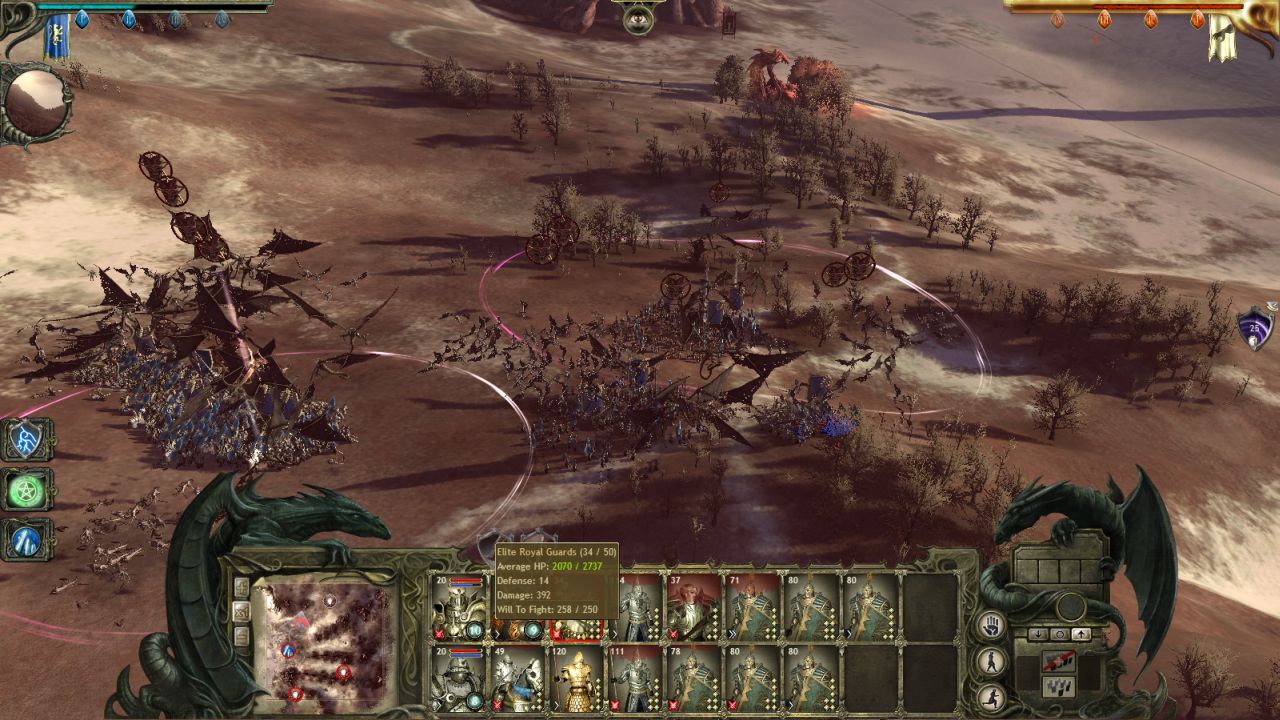
Skirmishes with flying beasts are uncharacteristically challenging
Diplomatic quests are less time consuming also interesting, simply giving you a variety of different choices on how to resolve a situation that will have different outcomes. For instance, you might choose how to deal with a pack of rogues that have been stealing from nearby empires and have now entered your borders. You could either have them killed, and in doing so steal the goods they acquired through pillaging; put them in jail and return the stolen goods to their rightful owners, which would improve relations with other nations, or let them go free with the agreement that they leave your empire and instead rob that of your enemies. While the choices presented seem very interesting, the outcomes are often unapparent or non- existent. Battle quests simply involve defeating an enemy army through the battle mechanisms discussed above.
Many actions will impact whether you are a tyrant, a rightful leader, a proponent of the old faith or one of Christianity. Unlike in other games where you are given bonuses for going heavily onto one side or the other, King Arthur II encourages you to balance these things. If you go too far onto one side of morality or religion, there will actually be harmful affects applied to your army. As a result, the morality and religious meter feels poorly implemented and detracts from the quality of the role playing aspects. It is a shame that the game doesn’t let you play as an outright diplomat throughout and avoid the troublesome battles, but unfortunately you have to defeat many armies, with even the auto-battle option being removed in some.
Further compounding the problems found in real time battles is sluggish and highly inconsistent performance. Using a powerful PC, the highest settings were totally unplayable, while even lowering the settings considerably resulted in the frame rate dipping into the low teens when zooming in on conflict. The game does boast technically impressive visuals, although it doesn’t look any better than last year’s Total War: Shogun 2, and that ran a whole lot better. The bad performance is associated with unresponsive control during the battles.
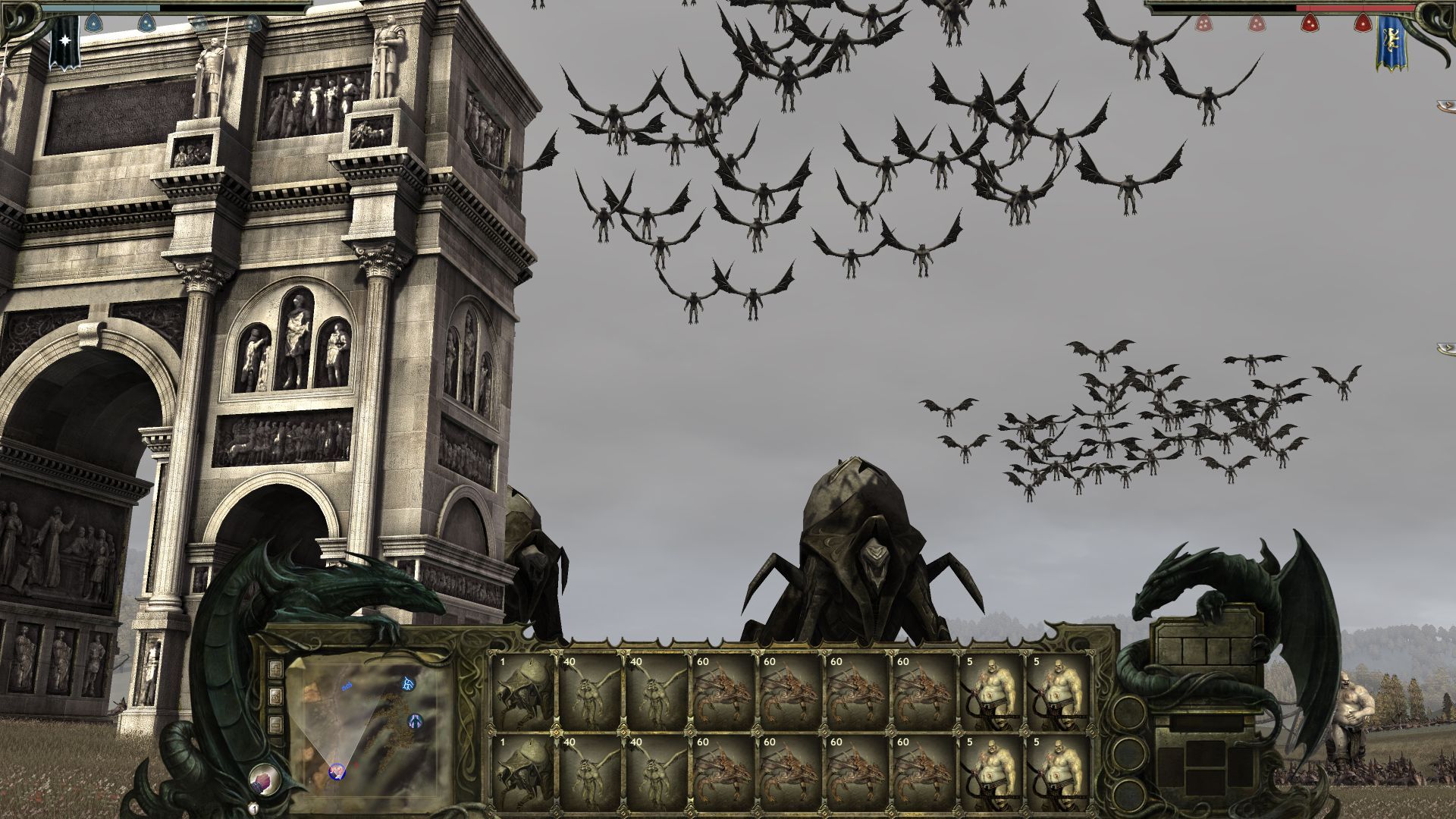
While sound effects in the game are decent enough, with battles sounding frantic and magic spells giving sharp cracks, the voice acting is wildly inconsistent. During battles, individual units remain silent while a quiet, monotone voice drones on in the background, saying things like “your unit is going to die; your soldiers are going to die; a spell was cast” which is most unhelpful because this verbal information is non-specific, and is better indicated visually on the screen anyhow. Fortunately, the sound track is great.
Even though King Arthur II has some interesting ideas and tries to do something unique by blending Role Playing elements with the Total War approach to strategy, in its current state the game is wildly inconsistent and very imbalanced. Battles generally provide no challenge and play out as chaotic melees, but are punctuated with a few brutally hard battles where the enemy army is composed of difficult to counter flying beasts. The role playing elements are interesting and add depth to the severely lacking strategically component, but overall King Arthur II feels like it could have been so much more with a bit more time and care put into optimization and balancing. Paradox has already released several patches, and with more this game could improve considerably, but in its current state, it is difficult to recommend.
